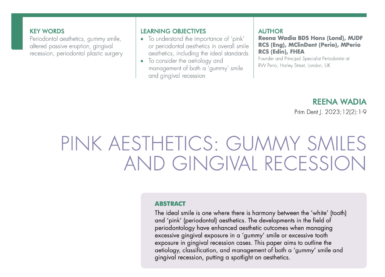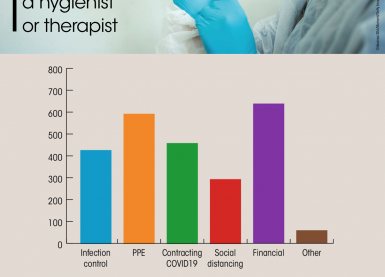Home/Articles
/ General Dental /
Reena’s Notes: Hygiene and therapy within the dental team with Ms Bal Chana
January 19, 2015

The importance of teamwork:
- Teamwork is crucial in dentistry as all members of the dental team need to contribute to help achieve quality patient care.
- The GDC standards document highlights the importance of teamwork e.g.: Principle 6: ‘Work with colleagues in a way that is in the patient’s best interest’. This is expanded to:
- ‘You must work effectively with your colleagues and contribute to good teamwork.’
- ‘You must ensure that any team you are involved in works together to provide appropriate dental care for your patients.’
- ‘You must value and respect the contribution of all team members.’
- ‘You must ensure patients are fully informed of the names and roles of the dental professionals involved in their care.’
- Benefits of team working include: shares workload, improves access and availability to patients, makes the system more cost effective and improves job satisfaction.
- Together Everyone Achieves More!
Who makes up the dental team?
- Members of the dental team include: the dentist, dental therapist, dental hygienist, ortho therapist, dental nurse, practice manager, receptionist, oral health educator, dental technician and clinical dental technician,
- Figures from GDC register – Dentists make up 83% of the clinical workforce. Dental hygienists form 12% of the clinical workforce and dental therapists only 5%. Surely DCPs cannot therefore be a threat to dentists, as some may believe!
Roles:
- Hygienists: OHI, fluoride varnish, smoking cessation advice, radiography, periodontal treatment.
- Therapists: All of the roles of a hygienist plus restorations on adults and children, deciduous extractions and pulp therapy to name a few.
Interesting facts and figures:
- Dental hygienists and therapists have been trained for over 60 years in the UK.
- Training takes 2.5/3 years.
- 250 hygienist/therapists are trained per year.
- There are 19 training schools in the UK.
Valuing your hygienist/therapist:
- Hygienists are more than just ‘cleaners’. Perhaps we should call the work they do: ‘preventive therapy’, ‘periodontal therapy’ and ‘periodontal maintenance/supportive therapy’.
- In practice, have regular meetings with the team and set up protocols for when the patient should see the hygienist/therapist.
- Medicine uses the skill mix very well with a referral up model rather than down as in dentistry – can we make use of this model? Or perhaps have a 2-way process?
- Evidence of the high standard of care provided by therapists – Allred 1977, Jones 1981, Seward 1978. Likely to still be the case!



